|
|
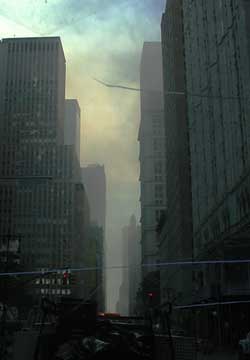 John Rivera: At Ground Zero - With a Ton of Industrial Respirators, Heavy Gloves and Socks John Rivera: At Ground Zero - With a Ton of Industrial Respirators, Heavy Gloves and Socks
as told to J. Alex Knoll; photos courtesy of John and Maria Rivera
Right, smoke-filled skies made 3pm look like twilight.
In the aftermath of the devastating terrorist attacks of September 11, Baysiders — like Americans everywhere — are looking for ways to grasp what has happened, for ways to find meaning in tragedy, for ways to perservere and push on. In times of turmoil and tribulation, even the simplest gestures take on significance, and from these acts everyday heroes are born.
Following September 11’s attack on New York and Washington, John Rivera, of Riva, followed the events and found himself driven to act. Here is his story.
I was listening to the radio. The firemen said they were getting a lot of donations, but not the things that they needed. They were getting paper dust masks, but for asbestos and noxious fumes they weren’t heavy enough. When I heard that, I knew I could make five phone calls and have a truckload of equipment. I run a construction company and crane rental business, so I understood what kind of work they were doing and what was needed.
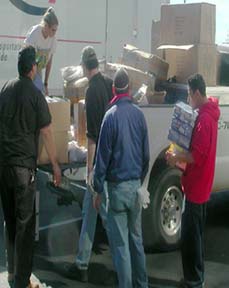 At left, John Rivera, far left, and wife Maria, in truck, help unload equipment and supplies. At left, John Rivera, far left, and wife Maria, in truck, help unload equipment and supplies.
On Friday morning, I started making phone calls to customers, vendors and even some of my competition.
A company up in Baltimore, Baltimore Masonry, donated $3,000 in respirators. William’s Equipment out of Jessup gave $600 in gloves. Standard Supply in Gaithersburg supplied $1,500 in miscellaneous goods: rubber gloves, work gloves, safety goggles and respirators. Of course my business donated.
I would just call a place up and tell them what I needed. When I showed up, they’d have an invoice for $2,000 of supplies and equipment. We just signed. They even helped us load up. All we had to do was show up.
From a total of maybe eight or nine people and businesses, I filled the truck to capacity. I took a large pickup truck, a couple thousand pounds.
Ground Zero
When we got there, it looked more like a giant demolition job. I’d never experienced anything like that. Normally you see a fire, and firemen are there and you know they have everything under control.
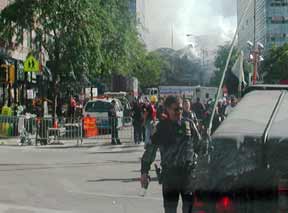 Police keep order at Ground Zero. In the background, a crane stands erect with mounds of debris surrounding and, in some cases piled higher than its 105-foot boom. Police keep order at Ground Zero. In the background, a crane stands erect with mounds of debris surrounding and, in some cases piled higher than its 105-foot boom.
It was a bizarre scene. There was just a pile of things that were donated, and they told us they weren’t taking any more. But when we told them what we had, they assigned us a military and police escort. We got in beyond the press perimeter.
I’ve never been to New York, so I don’t know the streets. But as we were being escorted from the Javits Center, the streets were lined with people, either volunteering or just there to show support, people waving flags and shouting thank you. I was kind of embarrassed at that point — it was just overpowering. It was so heartfelt. Really I didn’t plan on going through that kind of scene. It is not something I’m used to.
We got passed through all the military checkpoints and into the crowd. We made a hard right turn and we were standing next to the building — what was left of the World Trade Center.
It took your breathe away. It punched you in the stomach. There was a crane there. The height of the boom was 105 feet, and the pile of debris stretched beyond it. That pile of debris was so high, I’d never seen anything like it. Have you ever driven down S Street [in Washington] and the buildings are 10 to 11 stories high? The debris was that high. Everywhere we drove, there were more piles of debris.
Smoke was coming out of the ground, coming out of every hole. It looked like a war zone because there were police and military everywhere. The streets were covered in moon dust, and everyone was wearing respirators.
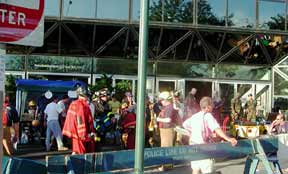
Firefighters rest outside one of the many office buildings turned command center.
We made two drops. As we handed out the load, they put it to use immediately.
The first thing volunteers asked for was welding equipment, and that was the one thing that I didn’t have time to get. You have 1,000 men working three shifts around the clock. They’re using that equipment up. By that time, they had purchased or had donated every tool for cutting steel from that surrounding area, New York, New Jersey.
Socks
We took 1,000 pairs of socks, from the smallest to the biggest sizes we could get.
I thought that this was one of those things that they’d have gotten a million of. But as soon as we unloaded the truck, police from all over the country came and took socks. These guys are working 12 or 13 hours a day, they’re walking through all the dust and debris from the building. Moon dust, like a fine powder. They’re walking through it everywhere. They needed socks.
We also took a lot of work boots. Because they’re walking through such ragged debris, their boots are just getting torn to shreds. Those got taken up immediately.
I’m only sorry that we didn’t react sooner. I started this Friday morning, and by 2pm I had a full truck. I’m still receiving donations, but now they say they don’t need any more.
Overtaken by Gratitude
When the people in New York asked me where I came from, all I said was that we were from the great state of Maryland. They were overtaken by the gratitude, the generosity. People coming in from all over the state, all over the country. There was a company there, out of North Jersey somewhere, with two tractor trailers of equipment. Those trucks were crammed packed. That stuff just came all day long.
Rescue workers, volunteers and bystanders lined the streets in thanks.


After we delivered our goods, our truck got commandeered to shuttle firemen back and forth. But after a while, once people stopped asking us for things, we got out of their way.
Once FEMA took over the site from the volunteers, the federal government had things more organized, more in control. At that point it was organized chaos.
We got home around 11 or midnight, Saturday. We didn’t stay overnight; we didn’t want to be in anybody’s way. But we did get some calls from volunteers who had gotten our phone number off the truck to give their thanks.
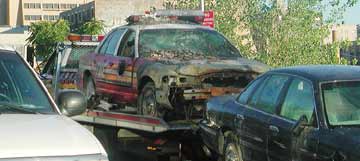 A fireman’s car, caught in the collapse of one of the Trade Center towers, is towed from the scene. A fireman’s car, caught in the collapse of one of the Trade Center towers, is towed from the scene.
I’m trying help in my own little way. It’s almost for selfish reasons, to help me. It’s certainly helped my wife, Maria. She’s the office manager at the Washington branch of Charles River Associates, a worldwide economic consulting company. One of the reasons we got involved was that Maria’s immediate supervisor, John C. Jenkins, was on Flight 11. He was out of their Boston office, and he was a real decent fellow.
I didn’t really do anything. I made some phone calls, pulled some things together and took a little bit of my time on a morning. What was remarkable was how people gave. I didn’t even have to ask. They just said,
“What do you need?”
What I did was a privilege. Like everybody else, I was pretty angry about this whole episode. Once we did this, some of my anger subsided.
Heroes Among Us will run for the duration of our response to the 9-11 Tragedy. Send your heroes and your stories to Bay Weekly, P.O. Box 358, Deale, MD 20751. Phone Sandra Martin: 410/867-0304; Fax 410/867-0307. E-mail [email protected].
Copyright 2001
Bay Weekly
|